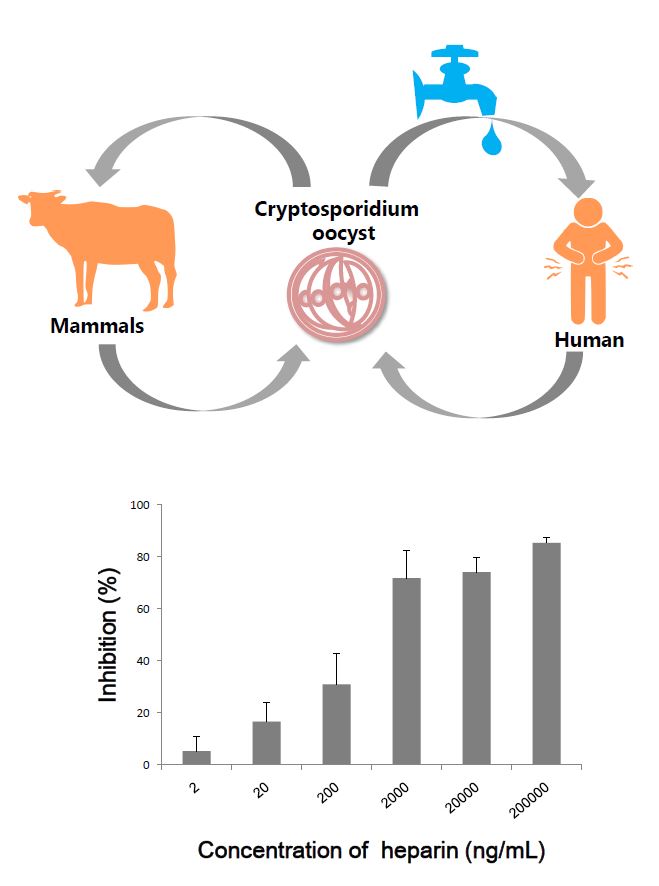Drug inhibits infection with cause of watery diarrhea

Life cycle of Cryptosporidium and inhibitory efficacy of heparin. (Upper) Life cycle of Cryptosporidium. (Bottom) Inhibitory efficacy of heparin on Cryptosporidium infection is concentration dependent (increases with concentration). © 2015 Kentaro Kato.
Researchers at the University of Tokyo and Obihiro University of Agriculture and Veterinary Medicine have demonstrated that heparin, a type of sulfated polysaccharide, inhibits infection with Cryptosporidium parvum, a protozoan that causes diarrhea in humans and other mammals. This will facilitate the development of anti-cryptosporidial agents.
Cryptosporidium is zoonotic pathogen (a pathogen that causes disease in animals and which can also infect humans), which infects a wide range of mammals including humans and cattle causing severe diarrhea.
The pathogen can cause outbreaks in humans through tap water because of its resistance to chlorination, and economic loss for farmers by infecting and causing severe diarrhea in young calves.
Therefore, the livestock sector requires effective measures against the pathogen and investigation of the mechanism of infection and development of new medicines are urgently needed.
In this study, Associate Professor Kentaro Kato and his group at the University of Tokyo Graduate School of Agricultural and Life Sciences and Obihiro University of Agriculture and Veterinary Medicine investigated whether sulfated polysaccharides inhibit infection by the Cryptosporidium parasite using cells derived from human colon tissue.
The group showed for the first time that heparin inhibits the infection of Cryptosporidium, and that the greater the concentration of heparin the greater the inhibitory effect.
In addition, the group investigated the mechanism of infection by the Cryptosporidium parasite, and elucidated that heparan sulfate, a sulfated polysaccharide found on the surface of mammalian cells, is involved in Cryptosporidium infection.
“This study will further promote our understanding of the interaction of heparin sulfate with Cryptosporidium and the mechanism of Cryptosporidium infection, and will facilitate the development of anti-cryptosporidial agents,” says Associate Professor Kato.
Paper
Atsuko Inomata, Fumi Murakoshi, Akiko Ishiwa, Ryo Takano, Hitoshi Takemae, Tatsuki Sugi, Frances Cagayat Recuenco, Taisuke Horimoto, and Kentaro Kato, “Heparin interacts with elongation factor 1α of Cryptosporidium parvum and inhibits invasion”, Scientific Reports Online Edition: 2015/7/1 (Japan time), doi: 10.1038/srep11599.
Associated links
U Tokyo Research article
Media Contact
More Information:
http://www.researchsea.comAll latest news from the category: Health and Medicine
This subject area encompasses research and studies in the field of human medicine.
Among the wide-ranging list of topics covered here are anesthesiology, anatomy, surgery, human genetics, hygiene and environmental medicine, internal medicine, neurology, pharmacology, physiology, urology and dental medicine.
Newest articles

NASA: Mystery of life’s handedness deepens
The mystery of why life uses molecules with specific orientations has deepened with a NASA-funded discovery that RNA — a key molecule thought to have potentially held the instructions for…

What are the effects of historic lithium mining on water quality?
Study reveals low levels of common contaminants but high levels of other elements in waters associated with an abandoned lithium mine. Lithium ore and mining waste from a historic lithium…

Quantum-inspired design boosts efficiency of heat-to-electricity conversion
Rice engineers take unconventional route to improving thermophotovoltaic systems. Researchers at Rice University have found a new way to improve a key element of thermophotovoltaic (TPV) systems, which convert heat…



